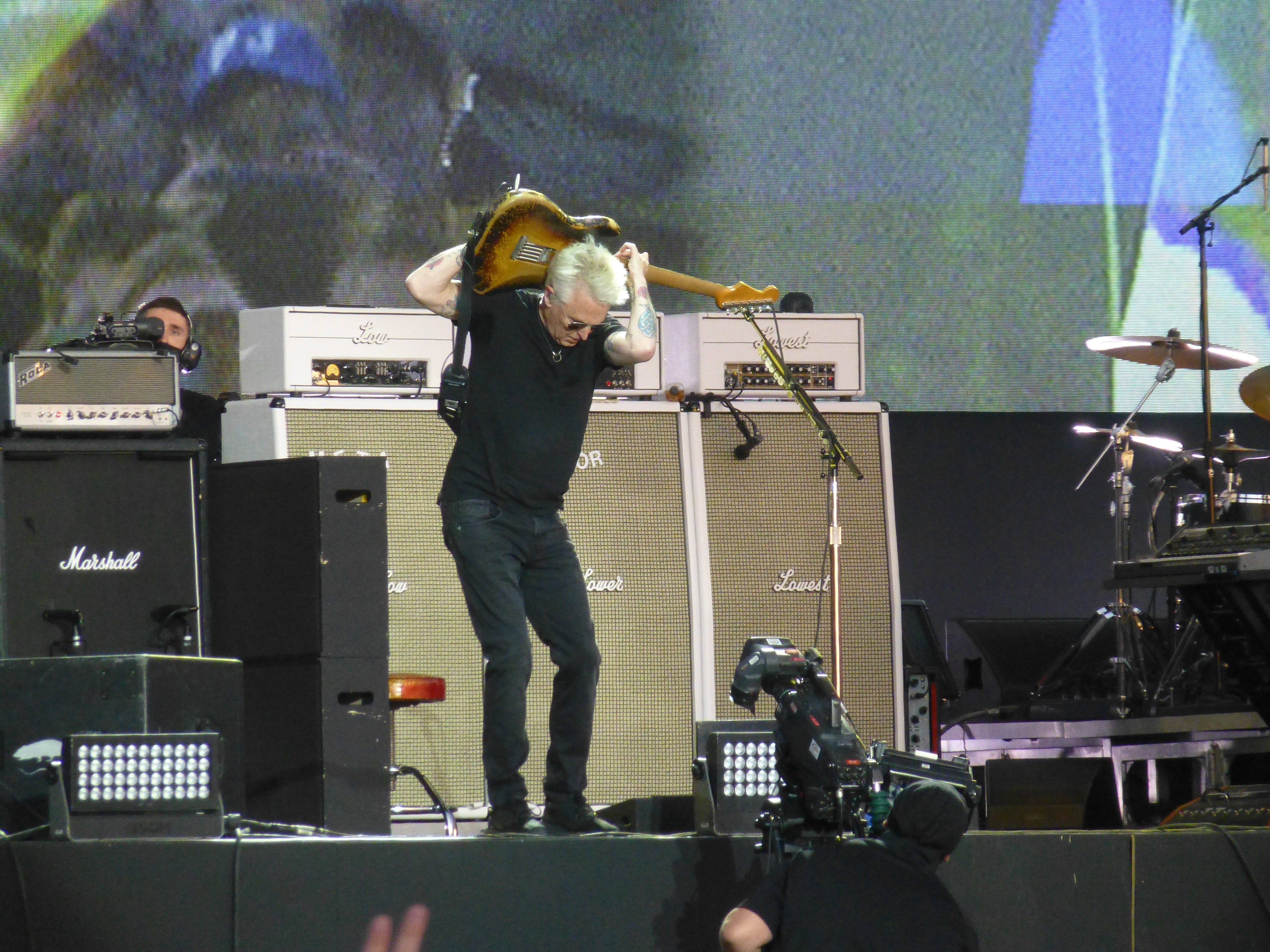1. Early life and musical beginnings
Mike McCready's early life in Seattle was steeped in music, leading him to pick up the guitar at a young age and embark on a musical journey that would eventually see him form and join several bands before his breakthrough success.
1.1. Childhood and early education
Michael David McCready was born on April 5, 1966, in Pensacola, Florida, but his family relocated to Seattle, Washington, shortly after his birth. During his childhood, his parents frequently played music by Jimi Hendrix and Santana, which contrasted with his friends' preference for bands like Kiss and Aerosmith. McCready often played bongo drums, developing an early connection to rhythm. At the age of eleven, he purchased his first guitar and began taking lessons, marking the formal start of his musical education.
1.2. Formation and dissolution of early bands
In eighth grade, McCready formed his first band, initially named Warrior, which soon changed its name to Shadow. The band started as a cover band performing during free periods at Roosevelt High School. Over time, they began writing original material and recording demo tapes. After high school, McCready worked at a pizza restaurant where he befriended musician Pete Droge. In 1986, Shadow moved to Los Angeles in an attempt to secure a record deal. However, this venture proved unsuccessful, with McCready noting that they "played to a couple bartenders down there" and that the band "weren't that good" at the time. Feeling "bummed out," they returned to Seattle. Shadow disbanded in 1988, marking the end of McCready's initial band experiences.
1.3. Re-engagement with music
Following the breakup of Shadow in 1988, McCready lost interest in playing guitar for a period, describing himself as "so depressed about life." He cut his hair, enrolled in a local community college, and worked nights at a video store. His passion for music was reignited by a friend named Russ Riedner, who helped him transition "out of my college mode and back into playing guitar." A pivotal moment was attending a Stevie Ray Vaughan concert at The Gorge Amphitheatre in George, Washington. McCready recalled that as Vaughan began playing "Couldn't Stand the Weather," large clouds rolled in and rain poured down, only to stop when the song ended. He described it as a "religious experience" that "lifted me out of the negative mindset" and encouraged him to play again. McCready gradually resumed playing and joined a band called Love Chile. During one of Love Chile's shows, his childhood friend Stone Gossard was impressed by McCready's performance of Stevie Ray Vaughan's "Couldn't Stand the Weather." Gossard, who had known McCready since before high school, approached him after the dissolution of his own band, Mother Love Bone, and invited McCready to play music together. After several months of practice, McCready encouraged Gossard to reconnect with former Mother Love Bone bassist Jeff Ament, laying the groundwork for future collaborations.
2. Main musical career
Mike McCready's main musical career is largely defined by his integral role in the formation and sustained success of Pearl Jam, alongside his significant contributions to the critically acclaimed project Temple of the Dog.
2.1. Temple of the Dog
The trio of McCready, Stone Gossard, and Jeff Ament were in the process of forming their own band when they were invited to participate in the Temple of the Dog project. This endeavor was initiated by Soundgarden frontman Chris Cornell as a musical tribute to his former roommate and Mother Love Bone vocalist Andrew Wood, who had died from a heroin overdose at age 24. The band's lineup was completed with the addition of Soundgarden drummer Matt Cameron.
Temple of the Dog began rehearsing songs Cornell had written while on tour prior to Wood's death, as well as re-working existing demo material by Gossard and Ament. This marked McCready's first experience in a recording studio, and he quickly took a central role in the project. He delivered a notable four-minute-plus solo for the song "Reach Down." Cornell recounted that McCready's headphones fell off halfway through the recording of the solo, yet he continued playing without being able to hear the backing track. McCready himself considers this particular track to be one of his proudest musical moments. The project later included vocalist Eddie Vedder, who had come to Seattle to audition for Ament and Gossard's new band (which would become Pearl Jam). Vedder performed a duet with Cornell on the song "Hunger Strike" and provided background vocals on several other tracks. Recognizing they had sufficient material for a full release, the band recorded and released the album Temple of the Dog through A&M Records in April 1991. The album's creation was significant as it served as a precursor to the formation of Pearl Jam, bringing together key members of the burgeoning grunge scene.
2.2. Pearl Jam
Mike McCready has been a central figure in Pearl Jam since its inception, contributing his distinctive guitar work to the band's enduring sound and massive success.
2.2.1. Formation and breakthrough
Pearl Jam was officially formed in 1990 by Jeff Ament, Stone Gossard, and Mike McCready. They subsequently recruited vocalist Eddie Vedder and drummer Dave Krusen. The band initially adopted the name Mookie Blaylock but were compelled to change it to Pearl Jam after signing with Epic Records in 1991. Following the completion of recording sessions for their debut album, Ten, Krusen departed from the band in May 1991. He was replaced by Matt Chamberlain, who had previously played with Edie Brickell & New Bohemians. Chamberlain's tenure was brief; after performing only a few shows, including one filmed for the "Alive" music video, he left to join the Saturday Night Live band. Chamberlain recommended Dave Abbruzzese as his replacement, who then joined Pearl Jam and performed for the remainder of the live shows supporting the Ten album.

The release of Ten propelled Pearl Jam into the mainstream, establishing it as one of the best-selling alternative albums of the 1990s. The band quickly became a prominent voice amidst the sudden popularity and attention surrounding the Seattle music scene and the grunge genre. McCready's guitar playing on Ten frequently featured solos that infused a blues touch into the music, heavily influenced by Stevie Ray Vaughan. The single "Jeremy" earned Grammy Award nominations for Best Rock Song and Best Hard Rock Performance in 1993. Pearl Jam's music video for "Jeremy" garnered four awards at the 1993 MTV Video Music Awards, including Video of the Year and MTV Video Music Award for Best Group Video. Rolling Stone magazine recognized the album's impact by ranking Ten at number 207 on its list of the 500 greatest albums of all time, while "Jeremy" was placed at number 11 on VH1's list of the 100 greatest songs of the 1990s.
2.2.2. Continued success and challenges
Following an intense touring schedule in support of Ten, Pearl Jam entered the studio to record their second album, Vs., which was released in 1993. Upon its debut, Vs. set a record for the most copies of an album sold in a single week at the time and held the number one spot on the Billboard 200 for five consecutive weeks. The album received a nomination for a Grammy Award for Best Rock Album in 1995. From Vs., the song "Daughter" was nominated for a Grammy Award for Best Rock Performance by a Duo or Group with Vocal, and "Go" received a Grammy nomination for Best Hard Rock Performance.

Feeling the intense pressures of their rapid success, Pearl Jam made a conscious decision to scale back their album promotion efforts, notably refusing to release music videos. In 1994, the band initiated a widely publicized boycott against Ticketmaster, which lasted for three years and significantly restricted their ability to tour extensively in the United States. Later that same year, the band released their third studio album, Vitalogy, which became their third consecutive album to achieve multi-platinum status. Vitalogy earned Grammy nominations for Album of the Year and Best Rock Album in 1996 and was ranked at number 492 on Rolling Stone magazine's list of the 500 greatest albums of all time. The album's lead single, "Spin the Black Circle", was awarded a Grammy for Best Hard Rock Performance in 1996. Although drummer Dave Abbruzzese performed on Vitalogy, he was dismissed from the band in August 1994, four months before the album's release. The band cited political differences, particularly his disagreement with the Ticketmaster boycott, as the reason for his departure. Abbruzzese was replaced by Jack Irons, a close friend of Eddie Vedder and the former drummer of the Red Hot Chili Peppers.
2.2.3. Later albums and ongoing activities
Following the release of Vitalogy, Pearl Jam continued to evolve. The band released No Code in 1996 and Yield in 1998. In 1998, prior to Pearl Jam's U.S. Yield Tour, Jack Irons departed the band due to dissatisfaction with touring. Pearl Jam then enlisted former Soundgarden drummer Matt Cameron as Irons' replacement, initially on a temporary basis, though he quickly became a permanent member. The song "Do the Evolution" from Yield received a Grammy nomination for Best Hard Rock Performance. In 1998, Pearl Jam recorded "Last Kiss", a cover of a 1960s ballad popularized by J. Frank Wilson and the Cavaliers. This track was initially released on the band's 1998 fan club Christmas single, but due to overwhelming public demand, it was issued as a single in 1999. "Last Kiss" peaked at number two on the Billboard charts, becoming the band's highest-charting single.

In 2000, Pearl Jam released their sixth studio album, Binaural, and simultaneously initiated a successful and ongoing series of official bootlegs. The band notably released 72 such live albums in 2000 and 2001, setting a record for the most albums to debut on the Billboard 200 at the same time. "Grievance", also from Binaural, received a Grammy nomination for Best Hard Rock Performance. The band's seventh studio album, Riot Act, followed in 2002. Pearl Jam's song "Man of the Hour", contributed to the 2003 film Big Fish, was nominated for a Golden Globe Award in 2004. Their eighth studio album, the eponymous Pearl Jam, was released in 2006. The band has since continued its prolific output with Backspacer (2009), Lightning Bolt (2013), and Gigaton (2020), maintaining a sustained and active presence in the music industry.
3. Other musical projects
Beyond his foundational role in Pearl Jam, Mike McCready has been involved in several other significant musical projects and collaborations, showcasing his versatility and dedication to various creative endeavors.
3.1. Mad Season
During the production of Pearl Jam's 1994 album Vitalogy, Mike McCready entered rehabilitation in Minneapolis, Minnesota. There, he met bassist John Baker Saunders of The Lamont Cranston Band. Upon their return to Seattle in 1994, McCready and Saunders formed a side band, initially called The Gacy Bunch, with vocalist Layne Staley of Alice in Chains and drummer Barrett Martin of Screaming Trees. After a series of live shows, the band changed its name to Mad Season. The band released their sole album, Above, through Columbia Records in 1995. They became widely known for the single "River of Deceit". The band's activities ceased following Saunders' death in 1999 due to a heroin overdose. Staley tragically passed away three years later in 2002 from an apparent overdose of heroin and cocaine.
Mad Season's legacy has been honored through posthumous releases and performances. On February 28, 2010, McCready participated in the "Hootenanny For Haiti" at the Showbox at the Market in Seattle. During this event, he performed a cover of "River of Deceit," marking the first time the song had been played live since Mad Season's disbandment, with Jeff Rouse on vocals. In 2013, a 3-disc deluxe edition of Above was re-released, along with a vinyl format that included three new songs featuring Mark Lanegan on vocals. In 2015, Live at the Moore 1995 was released on 12-inch vinyl to commemorate the 20th anniversary of the band's final show. Earlier in 2015, the surviving members, McCready and Martin, collaborated with the Seattle Symphony for a concert at Benaroya Hall titled Sonic Evolution, featuring special guests. This performance was later released on CD and 12-inch vinyl.
3.2. Neil Young Collaboration (Mirror Ball)
Mike McCready participated in Neil Young's 1995 album, Mirror Ball, alongside other members of Pearl Jam. Following the album's release, McCready joined Young for an eleven-date tour across Europe as part of Young's backing band. This collaboration proved highly successful, with Young's manager Elliot Roberts describing it as "one of the greatest tours we ever had in our whole lives."
3.3. The Rockfords
McCready also played with another side band known as The Rockfords, named after one of his favorite television shows, The Rockford Files. The band's lineup included McCready's former high school friends from Shadow, along with vocalist Carrie Akre of Goodness. The Rockfords' self-titled debut album was released on Epic Records in 2000. In 2021, the band successfully secured the rights to their debut album, leading to its digital re-release in 2022.
3.4. Solo work
In a 2009 interview with San Diego radio station KBZT, Mike McCready indicated that he was working on a solo album, reflecting his intent to explore personal musical avenues outside of his band commitments.
3.5. Walking Papers
Mike McCready served as a guitarist in the band Walking Papers. The group's notable members also included then-former Guns N' Roses bassist Duff McKagan, Screaming Trees and Mad Season drummer Barrett Martin, and singer Jeff Angell. The band released their debut album in August 2013.
3.6. Levee Walkers
In 2016, a new project involving Mike McCready, Duff McKagan, Barrett Martin, and Jaz Coleman, collectively known as The Levee Walkers, released two songs on McCready's record label, HockeyTalkter Records. The group continued to release new material, with the song "All Things Fade Away" featuring singer Ayron Jones following in 2017.
4. Musical style and equipment
Mike McCready's guitar playing is characterized by its raw, blues-driven energy and intuitive approach, supported by a distinct selection of guitars and amplification.
4.1. Musical style and influences


Mike McCready prefers to play "by ear" rather than adhering to a strictly technical approach, admitting his ignorance of technical intricacies. He emphasizes his intuitive playing style, stating that he "always done it by ear" and prefers discussing broader topics over guitar specifics. His guitar style is predominantly aggressive and bluesy, described by Greg Prato of Allmusic as "feel-oriented" and "rootsy."
McCready has cited a range of iconic guitarists as his major musical influences, including Jimi Hendrix, Stevie Ray Vaughan, David Gilmour, Keith Richards, Pete Townshend, and Eddie Van Halen. He particularly highlights the transcendent experience of seeing Stevie Ray Vaughan live, which he credits with helping him better understand and internalize Hendrix's techniques. Furthermore, McCready is an ardent fan of The Rolling Stones, considering them his favorite band of all time, and has expressed his deep admiration for their late drummer, Charlie Watts. He has also mentioned Heart as an influence on his musical development.
McCready is known for his dynamic stage presence, often entering a "meditative state" while performing live, which he describes as a unique experience he doesn't achieve in any other way.
4.2. Songwriting contributions
Over time, Mike McCready's contributions to Pearl Jam's songwriting process have steadily increased. His initial writing contribution for the band was co-writing the music for the B-side "Yellow Ledbetter" (released with the "Jeremy" single), which has since become a frequent set-closing song during Pearl Jam's live performances. He later co-wrote material for the album Vs. and was solely responsible for the music of "Present Tense" from the album No Code. His contributions became more prominent on the band's 1998 album, Yield, for which he wrote the music for three tracks, including one of Pearl Jam's biggest hits, "Given to Fly".
Most of McCready's sole compositions for Pearl Jam, with the exception of "Force of Nature" from Backspacer, utilize alternate tunings. Examples include open G on "Faithfull" (from Yield), a variation of open D on "Given to Fly", and a variation of open G on "Marker in the Sand" (from Pearl Jam). In 2006, McCready made his first lyrical contribution for the band with the track "Inside Job," which concludes their self-titled album.
4.3. Equipment
Mike McCready is known for using a diverse array of guitars, though Fender Stratocasters were his primary choice during Pearl Jam's formative years and continue to be a constant presence in his arsenal. His collection has expanded to include Gibson Les Pauls and Gibson Les Paul Juniors, among other models.
The Fender Stratocaster has been his most consistently used guitar throughout his career. McCready employs various types of Stratocasters, encompassing both vintage and modern models. He has even used left-handed Stratocasters with reversed strings to achieve a more trebly sound on the lower strings from the slanted bridge pickup, a technique famously employed by Jimi Hendrix. His most cherished model is a 1960 Stratocaster with a slab rosewood fretboard, which was the first in a series of vintage guitars modeled after a 1959 design, inspired by Stevie Ray Vaughan's "Number One" guitar. In 2021, it was confirmed that his prized Stratocaster was indeed a 1960 model. That same year, the Fender Custom Shop produced a limited edition replica of McCready's original sunburst 1960 Stratocaster. In 2023, Fender released a more accessible Made in Mexico signature model of his 1960 Stratocaster.
His second most frequently used guitar is a Gibson Les Paul. He now utilizes it for live performances of songs such as "Alive", "Brain of J." (from Yield), and "Given to Fly". Among his collection, his most frequently played Les Paul is a 1959 Standard, previously owned by Jim Armstrong, guitarist for Van Morrison's band, Them. More recently, he has incorporated a single-pickup Gibson Les Paul Junior, a TV yellow 1959 model, into his setup. He also owns Gibson Les Paul Specials. For certain live performances, such as "Corduroy" (from Vitalogy), "World Wide Suicide" (from Pearl Jam), and "Marker in the Sand", he employs Fender Telecasters. In 2016, Gibson also produced a signature, limited edition version of McCready's 1959 original Les Paul Standard, featuring true historic specifications.
His amplification setup includes:
- A 65Amps Empire 22-watt head, typically run through a 65Amps 2x12 open-back speaker cabinet equipped with Celestion G12H30 and Alnico Blue speakers.
- A Satellite Atom 36-watt head, connected to a Marshall 260-watt closed-back 4x12 cabinet with Celestion Vintage 30s.
- A 1963 blonde Fender Bassman AB165, paired with a Savage Audio open-back 2x12 cabinet.
McCready's pedalboard configuration features a variety of effects:
- MXR Custom Audio Electronics MC-404 CAE Wah
- Electro Harmonix Stereo Electric Mistress Flanger
- Xotic EP Boost
- Ibanez TS-9 Tube Screamer Overdrive
- Diamond Compressor
- Line 6 DL-4 Delay
- MXR Uni-Vibe
- Earthquaker Devices Afterneath V2 Reverb
- MXR Carbon Copy Analog Delay
- Electro Harmonix POG2 Polyphonic Octave Generator
- MXR Phase 90 Phaser
- Radial Engineering JX44 Air Control
- MXR/CAE MC-403 Power Distributor
5. Recognition and awards
Throughout his career, Mike McCready's guitar playing has garnered significant critical acclaim and received formal honors for his musical contributions and advocacy.
5.1. Critical reception
Mike McCready's guitar playing has consistently received praise from music critics and publications. In a review of Pearl Jam's 2006 self-titled album, Rolling Stone editor David Fricke publicly acknowledged his mistake in omitting both McCready and Pearl Jam rhythm guitarist Stone Gossard from the publication's 2003 feature "The 100 Greatest Guitarists of All Time." In 2007, McCready's iconic guitar solos from "Alive" and "Yellow Ledbetter" were recognized on Guitar World's "100 Greatest Guitar Solos" list.
In February 2007, Rolling Stone included McCready and Gossard together in its list of "The Top 20 New Guitar Gods," collectively referring to them as a "four-armed monster." McCready was also ranked at number 6 on Rolling Stones separate list of "The Twenty-Five Most Underrated Guitarists" and subsequently placed at number 1 on Ultimate Guitar's list of the most underrated guitarists of all time. In 2023, both McCready and Gossard were included on Rolling Stones "The 250 Greatest Guitarists of All Time" list at number 124. Adam Perry of City Pages specifically lauded McCready, stating that if he were in a jam band or not overshadowed by a "polarizing, sometimes too-outgoing frontman," he would likely be "carved into the Mt. Rushmore of guitar gods."
5.2. Awards and honors
On May 10, 2018, Mike McCready was honored with the Stevie Ray Vaughan Award from MusiCares. This recognition was bestowed for his dedicated support of MusiCares and his unwavering commitment to assisting others through the addiction recovery process.
6. Personal life and advocacy
Beyond his musical career, Mike McCready's personal life is characterized by his family commitments, his open battle with a chronic illness, and his passionate engagement in various social causes and philanthropic efforts, including his work as a photographer.
6.1. Family and health issues
Mike McCready is married to Ashley O'Connor, and together they have three children. As of 2005, the family resided in Seattle, Washington.
McCready was diagnosed with Crohn's disease at the age of 21. He has been a vocal advocate for raising awareness about the condition and has actively worked to improve healthcare access. He publicly endorsed President Barack Obama specifically for his health care program, which mandated health insurance availability for individuals with pre-existing conditions. In 2012, McCready produced a video titled "Life is a Pre-existing Condition," emphasizing the critical importance of nationalized healthcare. To further support this cause, McCready performs an annual concert to benefit the Northwest chapter of the Crohn's and Colitis Foundation of America. He has participated in this event with a UFO tribute band called Flight to Mars, as well as a reunited lineup of his early band, Shadow.
6.2. Substance abuse and recovery
Like many figures associated with the Seattle grunge scene, Mike McCready has experienced two distinct periods of struggle with substance abuse. The first occurred during the production of Pearl Jam's 1994 album Vitalogy, when McCready was actively battling drug and alcohol addiction. He recalled that the band members expressed their concern, saying, "Hey Mike, you're getting way too fucked up," but they never considered removing him from the band, despite his frequent relapses. He described being "drunk and making an ass out of myself," but noted their concern and support. He achieved a period of sobriety but relapsed following the death of Kurt Cobain, stating that it "fucked with everybody really hard" and made him question "how do you get to that point of depression where suicide's the only way out?"
His second bout with substance abuse occurred during the sessions for Pearl Jam's 2000 album Binaural. McCready explained that he was dealing with personal problems and had become dependent on prescription drugs for pain, getting "caught up in it." His journey through recovery has been a consistent theme in his public life and advocacy.
6.3. Other interests and philanthropy
Outside of his musical pursuits, Mike McCready maintains diverse interests. His favorite literary author is John Steinbeck, and he considers The Grapes of Wrath his favorite book of all time. He is also an avid sports fan and a lifelong supporter of Seattle's professional sports teams, including the Seattle Seahawks, Seattle Mariners, and Seattle Sounders FC.
McCready actively engages in philanthropic activities. He was involved in raising funds for Roger Federer's charity, the Roger Federer Foundation, as part of the "Match for Africa" event. This non-competitive tennis exhibition, held in a packed Key Arena in Seattle on April 29, 2017, saw McCready team up with John Isner to compete against Roger Federer and philanthropist Bill Gates. Federer and Gates won the match 6-4. Additionally, McCready regularly donates to the Crohn's and Colitis Foundation, actively participating in their flag football tournaments.
6.4. Photography
In 2017, Mike McCready published a book showcasing his Polaroid photographs. Titled Of Potato Heads and Polaroids: My Life Inside and Out of Pearl Jam, and published by powerHouse books, McCready described the creation of the book as "an emotional ride." The photographs within the book document various aspects of his life and career within and outside of Pearl Jam, dating back to the early 1990s. The collection includes candid shots of the band on tour, fellow musicians such as Neil Young, Dave Grohl, Joey Ramone, and Jimmy Page, as well as glimpses into McCready's personal life.
7. Discography
Mike McCready's extensive discography reflects his primary role in Pearl Jam and significant contributions to numerous other bands and collaborative projects.
7.1. Temple of the Dog
| Year | Title | Label |
|---|---|---|
| 1991 | Temple of the Dog | A&M |
7.2. Pearl Jam
Mike McCready has been a core member of Pearl Jam since its formation, contributing to all of the band's studio albums.
- Ten (1991)
- Vs. (1993)
- Vitalogy (1994)
- No Code (1996)
- Yield (1998)
- Binaural (2000)
- Riot Act (2002)
- Pearl Jam (2006)
- Backspacer (2009)
- Lightning Bolt (2013)
- Gigaton (2020)
7.3. Mad Season
| Year | Title | Label | Track(s) |
|---|---|---|---|
| 1995 | Above | Columbia | All |
| Working Class Hero: A Tribute to John Lennon | Hollywood | "I Don't Wanna Be a Soldier" | |
| 1996 | Bite Back: Live at Crocodile Cafe | PopLlama | "River of Deceit" (live) |
| 2013 | Above (Deluxe Edition) | Columbia/Legacy | All |
| 2015 | Live at the Moore 1995 | Columbia/Legacy | All |
| 2015 | Seattle Symphony- Sonic Evolution (Live at Benaroya Hall) | Monkeywrench Records | All |
7.4. The Rockfords
| Year | Title | Label | Track(s) |
|---|---|---|---|
| 2000 | Down to You: Music from the Miramax Motion Picture | Epic | "Silver Lining" |
| The Rockfords | Epic | All | |
| 2003 | Live Seattle, WA 12/13/03 | Kufala | All |
| 2004 | Waiting... | Ten Club | All |
7.5. Contributions and collaborations
Mike McCready has also lent his guitar skills to numerous recordings and performances by other artists and projects.
| Year | Artist(s) | Title | Label | Track(s) |
|---|---|---|---|---|
| 1992 | Lazy Susan | Twang | Silver Eye | "Bored" |
| 1993 | Eddie Vedder and Mike McCready with G. E. Smith | The 30th Anniversary Concert Celebration | Sony | "Masters of War" (live) |
| M.A.C.C. (Mike McCready, Jeff Ament, Matt Cameron, and Chris Cornell) | Stone Free: A Tribute to Jimi Hendrix | Reprise/WEA | "Hey Baby (Land of the New Rising Sun)" | |
| 1995 | Neil Young | Mirror Ball | Reprise | All |
| 1996 | Goodness with Mike McCready (as Petster) | Schoolhouse Rock! Rocks | Rhino/WEA | "Electricity, Electricity" |
| $10,000 Gold Chain (MariAnn Braeden of Green Apple Quick Step with Mike McCready) | The Cable Guy: Original Motion Picture Soundtrack | Sony | "Oh! Sweet Nuthin'" | |
| Screaming Trees | Dust | Epic | "Dying Days" | |
| 1997 | Tuatara | Breaking the Ethers | Epic | "The Getaway" |
| Mark Eitzel | West | Warner Bros. | "Fresh Screwdriver" | |
| The Minus 5 | The Lonesome Death of Buck McCoy | Hollywood | Some | |
| Brad | Interiors | Sony | "The Day Brings" | |
| Eddie Vedder and Mike McCready | Tibetan Freedom Concert | Capitol | "Yellow Ledbetter" (live) | |
| 1999 | Goodness | These Days | Good-Ink | "Catching Fireflies" |
| 2000 | Stillwater | Almost Famous: Music from the Motion Picture | DreamWorks | "Fever Dog" |
| 2001 | Eddie Vedder and Mike McCready with Neil Young | America: A Tribute to Heroes | Interscope | "Long Road" (live) |
| 2002 | The Wallflowers | Red Letter Days | Interscope | "When You're on Top", "Everybody Out of the Water", "Too Late to Quit", "See You When I Get There", and "Everything I Need" |
| 2003 | Mike McCready, Stone Gossard, Cole Peterson, and Chris Friel | Live from Nowhere Near You | Funkhead Music | "Powerless" |
| 2004 | Heart | Jupiters Darling | Sovereign | "I'm Fine" |
| 2005 | Screaming Trees | Ocean of Confusion: Songs of Screaming Trees 1989-1996 | Epic | "Dying Days" |
| 2006 | Peter Frampton | Fingerprints | A&M | "Black Hole Sun" and "Blowin' Smoke" |
| 2008 | Kristen Ward | Drive Away | Mutt Moan Music | "With You Again" |
| 2009 | Dierks Bentley | Feel That Fire | Capitol Nashville | "Life on the Run" |
| The Wallflowers | Collected: 1996-2005 | Interscope | "When You're on Top" | |
| 2010 | Mike McCready | Fringe | N/A | "Northwest Passage" |
| 2011 | Tres Mts. | Three Mountains | Monkeywrench | various |
| 2012 | Soundgarden | King Animal | Universal Republic | "Eyelid's Mouth" |
| 2016 | Nando Reis | Jardim-Pomar | Relicário | "Pra onde foi" |
| 2022 | Ozzy Osbourne | Patient Number 9 | Epic | "Immortal" |